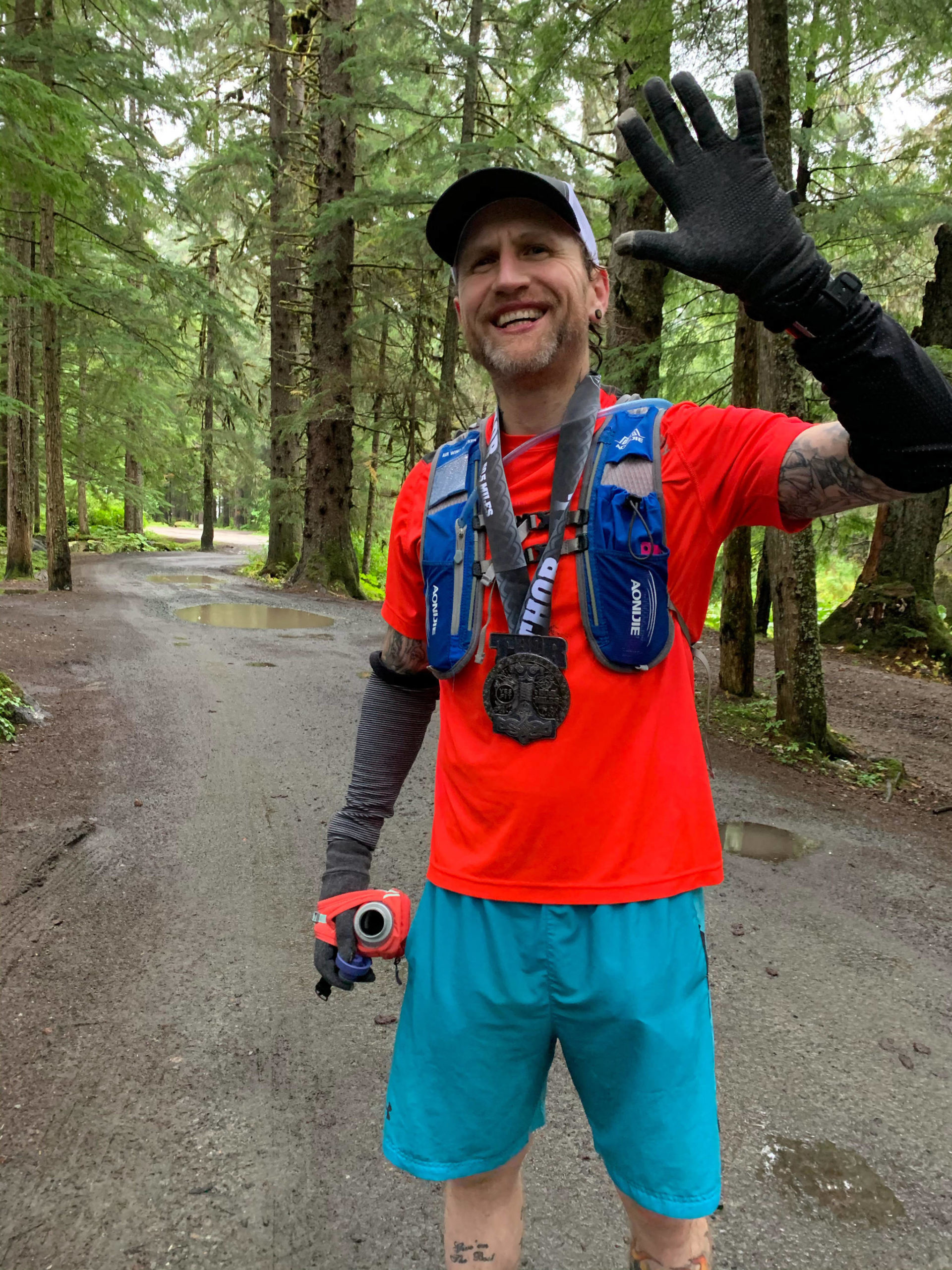Some people have gotten bored or stir crazy during quarantine, fretting about what to do.
It seems unlikely that Brian Murphy is one of them.
The 41-year-old recently ran 50 miles after fundraising to donate the money to Juneau Mountain Rescue, Juneau’s all-volunteer wilderness rescue nonprofit.
“The main reason; I had planned a bunch of races this year, but with everything going on, they all got canceled,” Murphy said in a phone interview.
A regular at Alaskan Brewing’s taproom, where Murphy works, proposed running the 50 for a charity.
“(She said) ‘Would you be interested in running it for JMR?’ I said ‘Sure, why not? I’d be happy to do that.’”
[NOAA survey vessel takes break from updating charts in Juneau]
Murphy, who has lived in Juneau with his wife and children for six years, said it was a way of supporting the community he lives in.
“My wife’s from Juneau, I’m from Ireland,” Murphy said. “Juneau’s been great, it’s my way of giving back.”
Putting the fun in fundraiser
One of the races Murphy was planning on running that was canceled was a 50-miler, a distance he’d never run before.
“It’s a great way to give back to the community and JMR is fantastic. It all came together there,” Murphy said. “I’ve done a few 50-kilometer (31-mile) races. Done the Juneau Marathon a few times. This was a venture into something new.”
Murphy and others set up a fundraising campaign and started getting sponsors.
“We decided to run it on the 30th (of August),” Murphy said. “We put together some sponsorship sheets so people could sponsor a mile of a 50-mile race.”
As the fundraising escalated, some of his friends came up with some interesting conditions.
“It started off as a little inside joke. My friend said, if you run a mile listening to Nickelback, I will give you $40,” Murphy said. “Some people started making other requests. It added a little incentive. It was fun and I made little videos for them.”
Murphy says he normally listens to heavy metal, but not when he runs, to keep from going too hard.
Just kept running
Kicking off his run at Echo Cove on the morning of Aug. 30, Murphy said the weather started acceptable but deteriorated as he soldiered on.
“The weather this summer has been horrendous. It came round to the day, and everything went according to plan,” Murphy said, before conditions worsened. “By Mile 25, I couldn’t open my nutrition pouches, people had to help.”
Murphy said his wife’s support, checking in and facilitating hydration on the way and his focus on getting to the finish to get JMR its fundraising money, were all that carried him through to the finish.
“It took me 9 hours and 11 minutes to run the 50 miles,” Murphy said.
That’s nearly 11 minutes per mile, even including time for a break at the half. Murphy said he’d consider fundraising again for other nonprofits in similarly high-profile endurance races in the future.
Future plans all around
The funds raised will help JMR continue its operations as it looks to the future.
“It was a great way to raise some money for us. We’ll likely be adding the money raised to our long-term building fund,” said Jackie Ebert, the section chief with JMR, in an email. “We are currently trying to secure funding/save money to pursue a long-term training facility that we can move into, or build.”
All members of JMR have a series of certifications they’re required to get before being made an active, operational member, which can cost a fair amount.
“Money that is donated to our organization also goes toward training and furthering our members’ skills, and keeping the organization running smoothly and contributing to all of the costs associated with it,” Ebert said.
As for Murphy himself, with a 50-miler under his belt, he’s got an eye on going even further.
“My goal next year is there’s a 24-hour endurance run down in Oregon that I plan to complete,” Murphy said.
His advice to any would-be high-endurance runners?
“Don’t listen to Nickelback,” joked Murphy about the famously lambasted Canadian rock band. “You gotta be mentally and physically prepared. Set yourself the goal. It’s an endurance race. Completing it is the goal. I’m just here to complete it and enjoy it. There were some fantastic views, even if it wasn’t a great day out.”
• Contact reporter Michael S. Lockett at (757) 621-1197 or mlockett@juneauempire.com.

